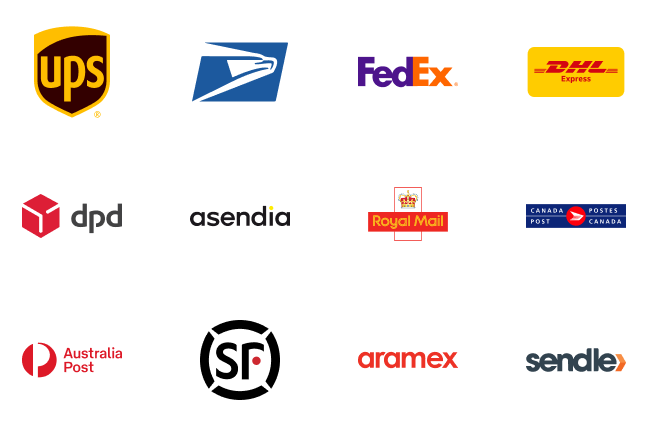Spoiler alert: Some items are more difficult to ship than others!
Items will have shipping restrictions imposed if there is any chance that they can cause harm to someone while being handled in transit. Restricted items are allowed to be shipped, but they must be packaged and labeled according to your courier’s requirements.
Shipping restricted items will also cost more since additional packaging and other services will be needed to ensure they are transported safely.
As unexpected shipping costs are a driving force in cart abandonment, it’s important to understand all costs associated with shipping restricted items domestically and cross-border so you can manage your shipping budget accordingly.
Why Do Couriers Have Shipping Restrictions?
In addition to ensuring the safety of their employees, couriers are also required to abide by all local, state, federal, and international laws.
By regulating what’s being shipped and proactively ensuring that shipments are properly labeled and handled, couriers can avoid any accidents or damage that can happen when a restricted item is in transit.
What Can I Ship?
It’s important to remember that shipping restrictions vary by courier. It’s highly recommended to visit your courier’s website or contact your courier account manager if you have any questions or concerns about their shipping requirements.
Can I ship alcohol?
You can ship alcoholic beverages, but it depends on what type it is and where it’s going. Your business will also need a license to ship to remain compliant with the law.
Postal services such as USPS do not allow alcohol shipments. Express couriers such as UPS, FedEx, and DHL do allow shipments, but on a case-by-case basis.
In addition to making sure your alcohol is properly labeled, packaged, and received by an adult that is 21 years of age or older, your courier may ask that you sign a special agreement that promises consistent volume each month.
Visit our post on how to ship alcohol for more actionable tips.
Can I ship breakable items?
You can ship fragile items, but it will be your responsibility to ensure that it is packaged correctly.
This means that you should find properly sized boxes that are durable and use enough padding to ensure the item doesn’t move during transit.
If your breakable item is worth over $100 USD, it's especially important to buy shipment insurance so you have coverage should something occur during delivery.
Visit our post on the packaging and shipping of fragile items to help you safely ship your items.
Can I ship computers and electronics?
Shipments involving computers and other electronics will depend on the type of batteries it contains.
Lithium-ion batteries are the most common batteries with shipping restrictions that are regularly sent domestically and cross-border.
Airfreight restrictions for lithium-ion batteries include special labeling and limiting the number of battery shipments that can be on a plane for each flight. Relying on ground transportation will give you more cost-effective options, although delivery time frames may take longer depending on the distance needed to travel.
If your electronics contain embedded lithium-ion batteries under 100Wh (PI 967), Easyship’s SDS exemption allows you to skip the documentation process and ship eligible items faster.
Learn more about shipping batteries from our post on dangerous goods.
Can I ship perishables and baked goods?
The ability to ship perishables and baked goods will vary by courier.
For example, USPS states that perishables that can easily decompose or cannot reach their destination without spoiling are nonmailable. Baked goods should be able to withstand ordinary mailing conditions (such as unregulated temperatures) and shouldn’t cause “an obnoxious odor, nuisance, or disturbance”.
Similar to shipping alcohol, express couriers can decide to ship your perishables if you enter a specific contract with them and ensure consistent shipping volumes per month.
For additional tips on how you can package perishable items, refer to our blog post on shipping frozen foods.
Can I ship firearms and hazardous materials?
Firearms are very tricky to ship, and restrictions depend on the type of firearm.
For example, USPS will not allow concealed handguns to be mailed unless the parties involved meet certain criteria. FedEx prohibits shipments of firearms that are 3D printed. UPS will only ship firearms through a special agreement, and DHL allows domestic US shipments of firearms only between licensed dealers.
Shipping hazardous materials will depend on the type of hazard class it is classified under. It’s best to refer to each courier’s hazardous shipping guides to help you determine the mailability of your shipment:
Can I ship tobacco?
Tobacco shipments are severely restricted. Many couriers do not allow shipments of tobacco to individuals. In most cases, if shipments are allowed, they are only between parties who are businesses or regulators and are licensed.
Surprisingly, USPS can handle intra-state mailings of tobacco in Alaska and Hawaii; however, mailing tobacco within the continental US remains prohibited.
Can I ship live animals?
Couriers will most likely not allow shipments of the following live animals:
- Warm-blooded animals
- Reptiles
- Poisonous insects or spiders
Accepted live animals that you can ship vary widely by courier, and may only be processed on a case-by-case basis. Refer to the following courier guides for more information:
Ship Restricted Items with Care
Shipping restricted items must be done carefully to ensure no one gets hurt during transit and that the shipment doesn’t violate any local laws, federal regulations, or international shipping rules.
Whether you're sending electronics, medical devices, nail polish perfumes, or lithium batteries, each may be subject to shipping restrictions depending on the destination country, postal service, or applicable laws. Some items, like alcoholic beverages, live animals, or smokeless tobacco, may be strictly prohibited or only allowed under limited circumstances.
Proper packaging requirements and following special requirements from the courier are key to ensuring your restricted items are accepted and delivered to the final destination without delay. It’s also important to consider the maximum weight, value, and whether your items fall under hazardous materials, perishable items, or prohibited and restricted items lists provided by carriers like USPS or your local post office.
At Easyship, our logistics experts are ready to help you navigate laws and regulations tied to international mail, foreign countries, and products sold online. We can assist with choosing the right courier and making sure your package meets all legal and transportation safety standards, including those regulated by agencies like the Drug Enforcement Administration when relevant.
To determine if your item is allowed, review the complete list of items prohibited by country, understand export and import laws, and confirm if any special conditions apply to your shipment.
Which Dangerous Goods Does Easyship Ship?
Class 9 Miscellaneous Dangerous Goods encompass a diverse range of items that, while essential in our daily lives, present potential hazards during shipping.
- Lithium-Ion Batteries: Easyship handles the shipping of rechargeable lithium-ion batteries commonly found in electronics like laptops and mobile phones.
- Lithium Metal Batteries: Easyship ships non-rechargeable lithium metal batteries often used in products like watches, digital cameras, and smoke detectors.
- Magnetized Material: Easyship manages the transportation of magnetized materials, which can be present in various everyday items without us realizing their potential risks.
- Dry Food & Supplements: Easyship ships dry food and dietary supplements, ensuring their safe transit to reach consumers without compromising health and safety.
- Health & Beauty Products: Easyship handles shipping for health and beauty products such as skincare items, powders, gels, and more, ensuring they're transported in compliance with regulations.
- Liquids: Easyship facilitates the shipment of liquid products, considering their unique transportation challenges to ensure their safe delivery.
Ready to ship? Sign up for a FREE Easyship account and stay on top of your shipping needs by using our great features
Frequently Asked Questions (FAQ)
What are restricted items in shipping?
Restricted items are products that can be shipped under specific conditions due to safety, legal, or regulatory concerns. Examples include alcohol, lithium batteries, perishables, and medical devices.
Can I ship items with lithium-ion batteries?
Yes, but they are subject to shipping restrictions—especially for air transport. If your item contains embedded lithium-ion batteries under 100Wh (PI 967), Easyship’s SDS exemption allows faster, documentation-free shipping for eligible products.
Why do shipping restricted items cost more?
Restricted items often require special packaging, documentation, and handling, which leads to higher shipping costs. Understanding these fees helps reduce cart abandonment and improves budgeting.
Which couriers allow alcohol or tobacco shipments?
UPS, FedEx, and DHL may allow alcohol shipments with special agreements. Tobacco shipments are highly restricted and usually limited to licensed businesses or regulators. USPS does not allow alcohol and has limited tobacco allowances.
Can I ship restricted items internationally?
It depends on the item and the destination country. Some items are strictly prohibited, while others require permits or special documentation. Always check the import laws and prohibited and restricted items list for the receiving country.















































.svg)
.svg)






.avif)
.avif)

.avif)
.avif)


.avif)


.avif)










.avif)
.avif)



.avif)
.avif)


.avif)
.avif)


.avif)



.webp)






.svg)





.webp)